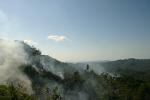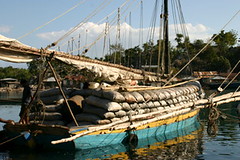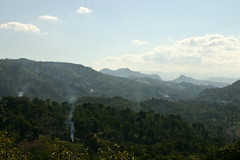Subsidize Propane, Please!
 Environmental reforms should be at the forefront of the agenda for the president elect of Haiti. If they aren’t soon enough there won’t be a country to be president of.
Environmental reforms should be at the forefront of the agenda for the president elect of Haiti. If they aren’t soon enough there won’t be a country to be president of.
Charbon, as charcoal is called in Haiti is a major resource for cooking. It is what people all over the country use, from the fritay ladies (fried food vendors) on the crowded streets of Port-au-Prince to the fritay ladies deep in the mountains. It is the cash crop of the poor. Suppliers are currently fetching about 25 Haitian dollars (about 3 US) a bag, the shipper is getting about 45 to 50 Haitian dollars (about 6 US) a bag when arriving at the port. At the rate of current production it looks as if a serious brush fire is about to consume the already sparse green canopy of Haiti’s countryside. And what is being done to stop it? Well nothing that has significantly curtailed production and nothing that has been culturally adopted to effect the consumption. Sure a few small-scale alternative fuel projects such as the Recho Mirak (Miracle Stove) which is a redesign of the common charcoal stoves used in Haiti. It simply encases the base of the stove where the charcoal burns intensifying the heat and slowing the burn rate. There is also the briquette, which is a very efficient, environmentally recycled product. It won a McArthur Foundation grant, but that doesn’t mean much here, too many people are still using charcoal. Although these initiatives are well intentioned they haven’t caught on for years and they aren’t going to anytime soon at least not soon enough to address the serious problems as a result of the massive deforestation to produce charbon. The problem is the demand is too high and the alternatives are too few.
On a recent trip out to the Grand Anse department of Haiti I observed some very frightening scenes. On a bike from Jeremie to Pestel I saw yards along the road filled with piles of charcoal sacks stacked 10 to 20 high waiting to be transported. There contents initialed the bags with the letters of the owners’ name. And I couldn’t help but notice the larger the pile of charbon in the yard the nicer the house. The port towns along the coast docked waiting boats as the trucks made numerous trips out to the mountains to pick up the cargo.  Sailboats were carrying over a 100 bags of charcoal per trip that would take 2 to 3 days to arrive in the capital. I spoke to one man lingering around the Pestel harbor who understood the dangers of the industry and unprovoked he said, “In 2 to 3 years the Grand Anse won’t have trees.” And whether 2 to 3 years is accurate or not is irrelevant. The mountains are on fire with charcoal pits smoking all day long in a country that is 90 some percent deforested this isn’t a good sign.
Sailboats were carrying over a 100 bags of charcoal per trip that would take 2 to 3 days to arrive in the capital. I spoke to one man lingering around the Pestel harbor who understood the dangers of the industry and unprovoked he said, “In 2 to 3 years the Grand Anse won’t have trees.” And whether 2 to 3 years is accurate or not is irrelevant. The mountains are on fire with charcoal pits smoking all day long in a country that is 90 some percent deforested this isn’t a good sign.
For environmental purists the consumption of another resource like propane may not be the answer but for Haiti there is no other. First the government should outlaw the production of charcoal and at the same time subsidize the alternative which would be small propane cooking tanks. Under other circumstances this may be the responsibility of the consumer but the initial cost of purchasing the tank is a barrier. When this barrier is overcome, subsidized, the personal expense is only a refill which is comparable to buying charcoal and at times less expensive because it is less influenced by other cost variables. There would be a cultural transition period but this cooking method is already ahead of the other alternatives being promoted in Haiti.
The president elect is an agronomist so he understands the situation. Many Haitians outside of Port-au-Prince depend on their land and so will their future generations so it is in their best interests to adopt the reforms. The situation in Port-au-Prince will only get worse with increased migration so it is in the residents’ best interest to reduce the demand by adopting the alternative method (propane), which, would decrease the migratory flow produced by worsening conditions in the provinces. The leaders have the knowledge, the people understand the situation let’s hope they can make the change.
the situation. Many Haitians outside of Port-au-Prince depend on their land and so will their future generations so it is in their best interests to adopt the reforms. The situation in Port-au-Prince will only get worse with increased migration so it is in the residents’ best interest to reduce the demand by adopting the alternative method (propane), which, would decrease the migratory flow produced by worsening conditions in the provinces. The leaders have the knowledge, the people understand the situation let’s hope they can make the change.
Add new comment